Key takeaways:
- Door-to-door campaigning fosters genuine connections and builds trust through direct interactions with voters.
- Listening to community concerns is crucial for candidates to effectively represent and advocate for their constituents.
- Adapting messaging to specific audience needs enhances engagement and strengthens bonds with voters.
- Perseverance in the face of rejection and negativity can lead to valuable insights and greater determination in future campaigns.
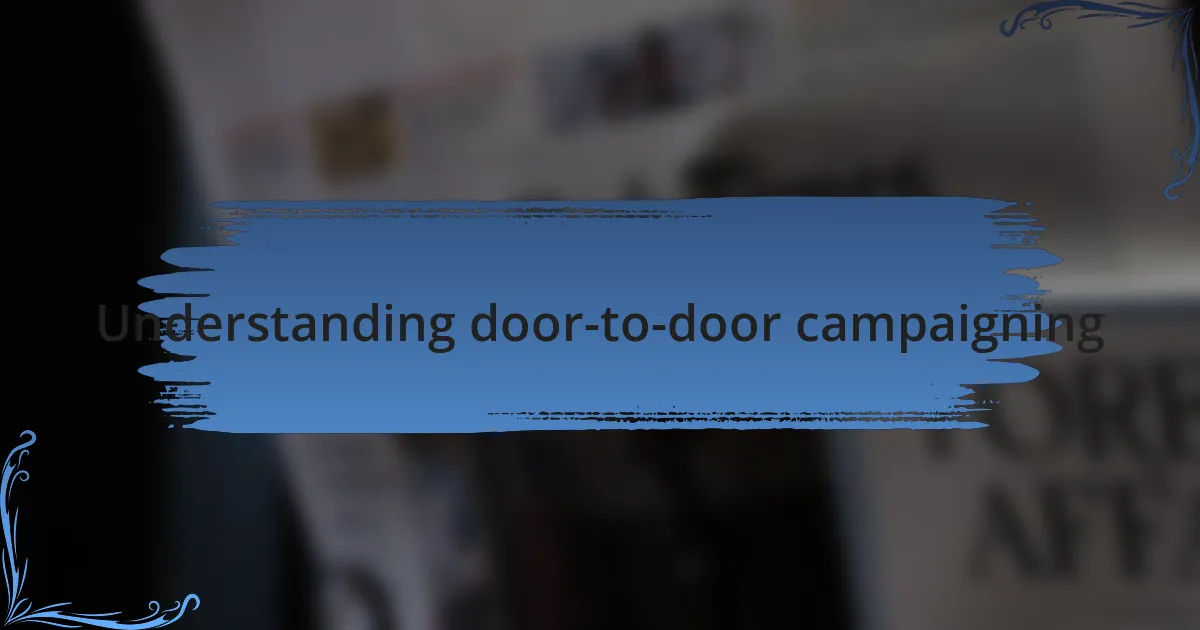
Understanding door-to-door campaigning
Door-to-door campaigning is an intimate way of connecting with voters, one home at a time. I’ll never forget my first experience. I knocked on a door, heart racing, and was met with a warm smile from the homeowner. It reminded me that behind every door is a person with their own stories and concerns. How often do we miss these genuine connections in our fast-paced lives?
What strikes me most about door-to-door campaigning is the direct impact it has on building trust. When you step onto someone’s doorstep, you’re not just introducing yourself; you’re offering a piece of yourself. I recall a moment when a voter shared a personal struggle with the current legal system, and it left me reflecting on the very real challenges people face. How powerful is it to be that face of support and change for someone in that moment?
Moreover, door-to-door efforts provide instant feedback that you simply can’t get from other campaigning methods. Each conversation is a window into the community’s pulse. I often think about how these interactions shape our understanding of public sentiment. Isn’t it fascinating to think that a simple knock can lead to profound insights about what people truly care about?
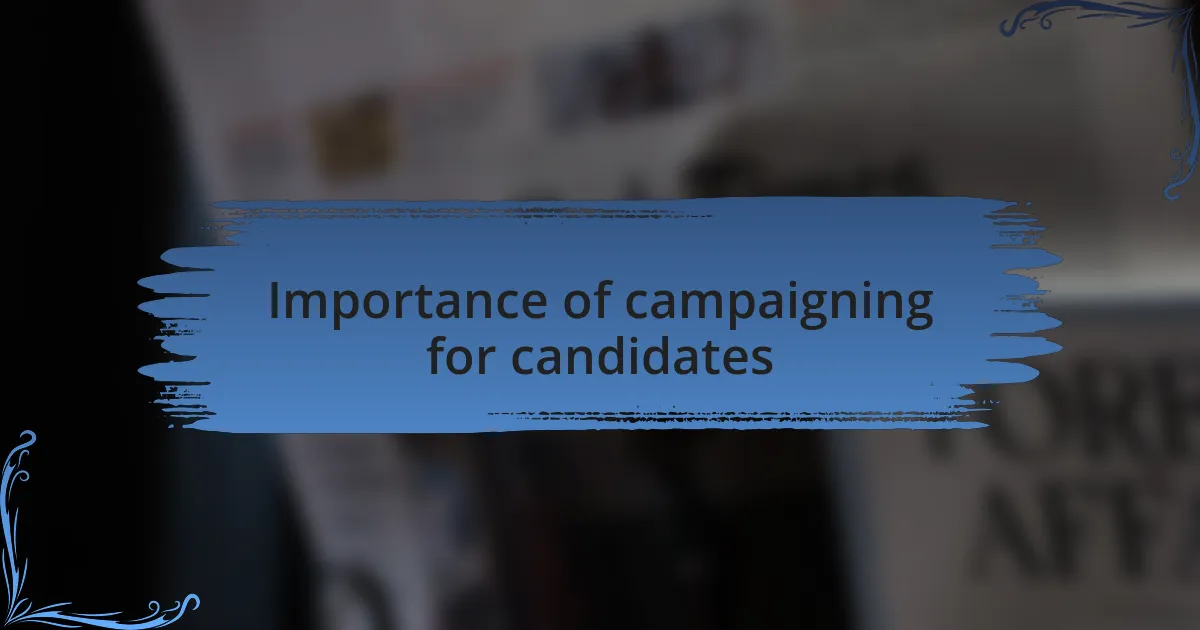
Importance of campaigning for candidates
Campaigning is the heartbeat of any candidate’s journey. When I first hit the pavement, I was amazed at how a direct conversation could ignite enthusiasm within a community. It’s almost exhilarating to witness how a simple exchange of ideas can inspire potential supporters and convert skeptics into allies. Have you ever felt that surge of energy in a room during a discussion? That’s what grassroots campaigning delivers.
One particularly memorable moment was when I met a retired teacher who shared her worries about educational funding. As I listened, I felt a deep sense of responsibility wash over me. It reinforced my belief that campaigns aren’t just about advocating policies; they’re about amplifying the voices of those who often go unheard. How can we claim to represent our community if we don’t first understand its most pressing needs?
Effective campaigning also fosters a sense of community. Each door I knocked on felt like an invitation to participate in a larger conversation. It’s like hosting a dinner party where everyone contributes a dish—each unique perspective makes for a richer discussion. Reflecting on those experiences, I realized the importance of being a candidate who not only listens but actively engages with the community. Isn’t it vital that our leaders truly know the people they represent?
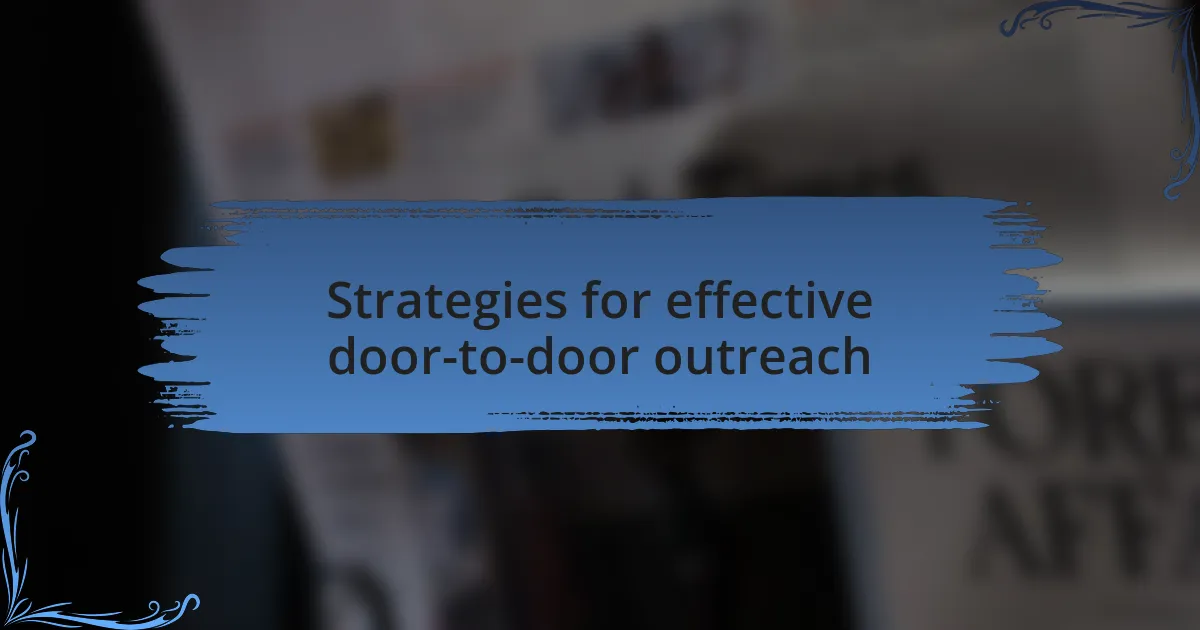
Strategies for effective door-to-door outreach
Understanding your audience is paramount in door-to-door outreach. I recall one afternoon when I approached a neighborhood where I assumed strong opinions on community safety. To my surprise, many residents were more focused on local park funding. Listening carefully opened up avenues for deeper engagement. How often do we make assumptions that cloud our ability to connect with others? I learned that tailoring my message to address their specific concerns can forge a stronger bond.
Building a rapport quickly is another crucial strategy. I remember walking up to a home and noticing a child’s artwork displayed on the porch. Instead of launching into my campaign spiel, I commented on the artwork, leading to a delightful conversation with the family. This simple act of connection made my message more relatable. Isn’t it amazing how a personal touch can transform a mere interaction into a meaningful exchange? Those moments reinforce the importance of finding common ground before discussing political agendas.
Finally, following up is essential for maintaining relationships and reinforcing engagement. After visiting one particular neighborhood, I took the time to send thank-you notes to families who shared their stories with me. This small gesture created a lasting impression. How often do we forget that little things, like a handwritten note or a quick call, can keep us in people’s minds? Integrating follow-up strategies can deepen trust and ensure that voters feel valued beyond the initial interaction.
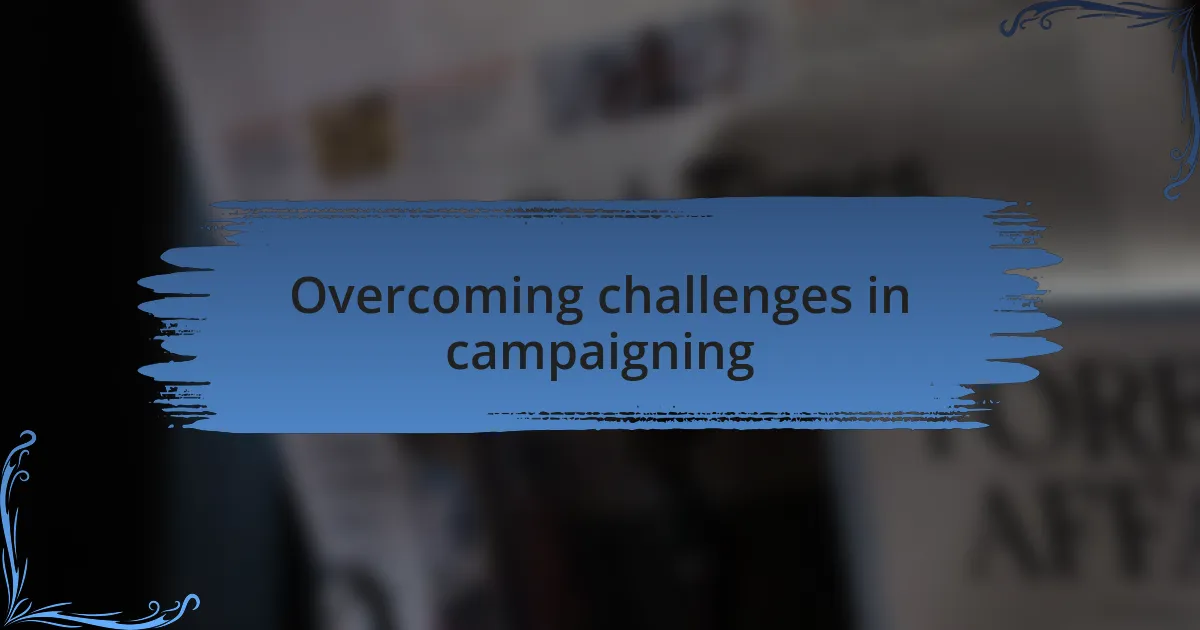
Overcoming challenges in campaigning
Facing challenges in campaigning is almost inevitable, especially during door-to-door efforts. There was a time when I encountered a resident who was hesitant to speak with me, clearly annoyed by unsolicited visits. Rather than pressing on with my agenda, I paused and acknowledged her frustration. It struck me then that understanding and validating someone’s feelings can break down barriers. Have you ever found that a simple moment of empathy can change someone’s stance?
Navigating negative responses is part of the territory. On one occasion, I was met with outright hostility at the door, which initially threw me off balance. Instead of retreating, I chose to respond with calm and respect, asking if there was something specific that concerned her. This opened a door to discussing her apprehensions. Reflecting on that experience, I realized that patience and openness often invite a more constructive dialogue. How many times do we let a single negative encounter define our overall experience?
Lastly, time management is crucial in overcoming challenges. I recall a day dedicated solely to canvassing, but the effectiveness of my outreach dwindled as fatigue set in. I learned that while enthusiasm is important, pacing myself and allowing for breaks can improve the quality of interactions. What good is determination if it leads to burnout? A balanced approach not only enhances my stamina but also helps in maintaining a positive, engaging presence when speaking to voters.
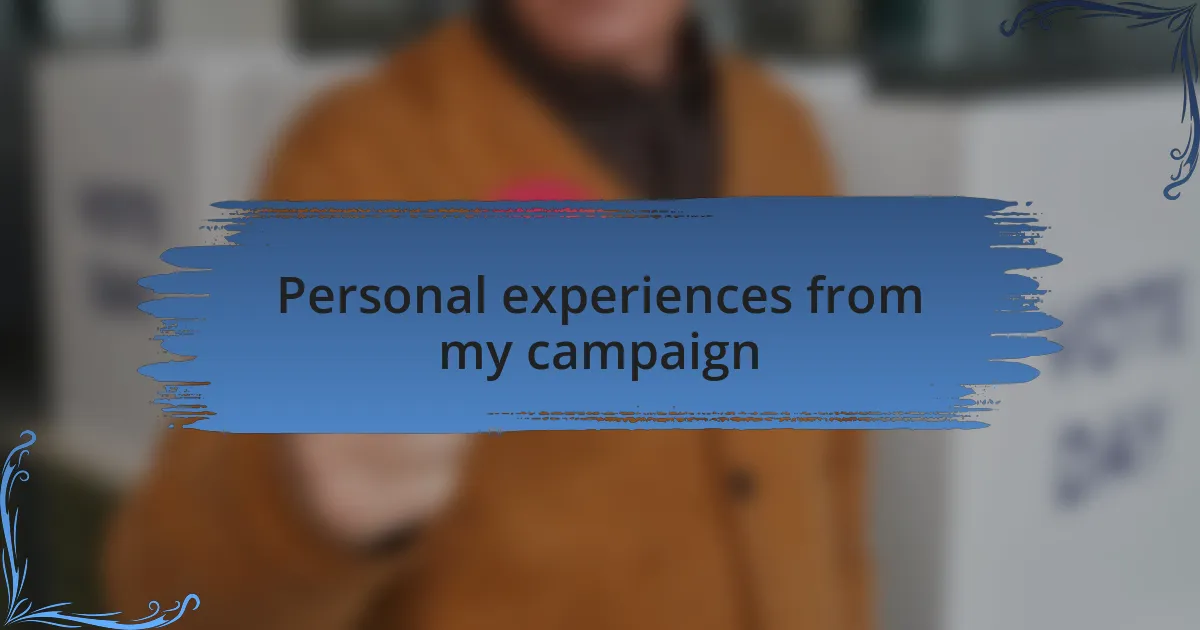
Personal experiences from my campaign
During my campaign, I faced moments that really tested my resolve. I remember one afternoon when I approached a young couple who seemed completely disinterested. At first, I felt discouraged, but then I decided to share a personal story about why I was passionate about running for Attorney General. To my surprise, they began to listen, and we ended up having a meaningful discussion about their concerns. Isn’t it fascinating how vulnerability can resonate with others?
Another experience that stands out involved an elderly gentleman who opened the door with a frown. He had clearly had a tough day, and I could sense the weight of his burdens. Instead of rushing to present my platform, I asked him how he was doing that day, and suddenly, the conversation shifted. He opened up about his worries, and I realized that sometimes simply being present and authentic can foster trust. Have you ever noticed how a small act of kindness can transform someone’s outlook?
There were also days when my feet ached from hours of canvassing. Yet, I pushed through because I was driven by my commitment to the community. On one particularly exhausting day, I almost decided to call it quits. But a chance interaction with a voter who was genuinely excited about my campaign reignited my passion. That moment taught me that while self-care is vital, the connections I make can be a powerful motivator. Have you ever felt rejuvenated by a simple conversation at just the right moment?
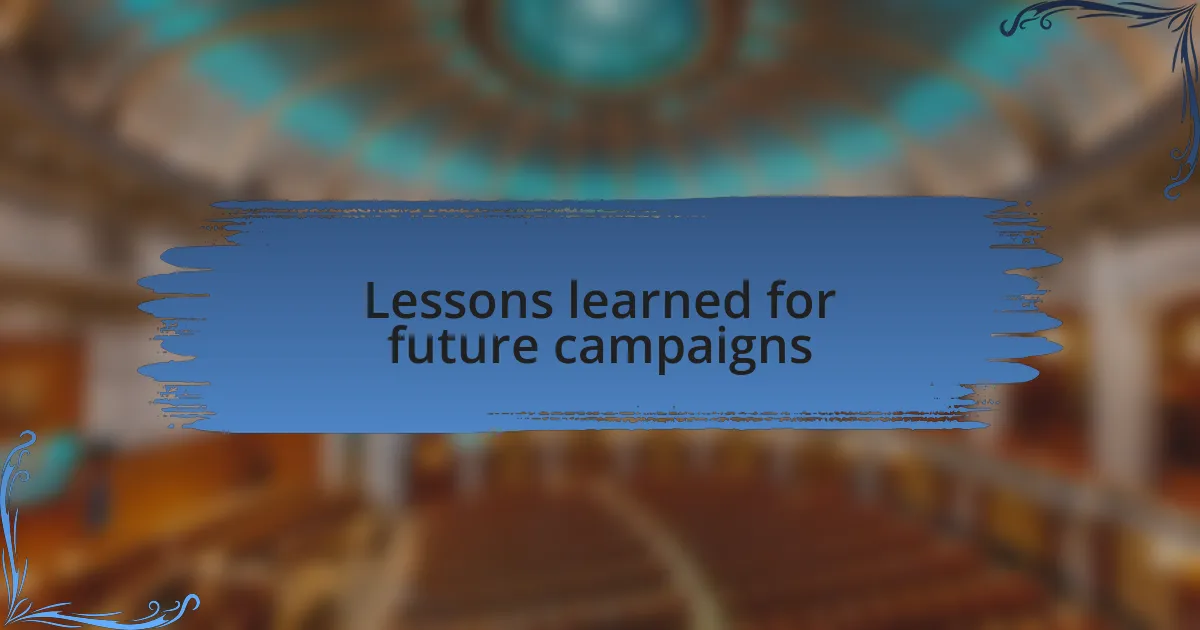
Lessons learned for future campaigns
One crucial lesson I learned is the importance of adaptability in campaigning. While knocking on doors, I encountered diverse communities, each with unique concerns and needs. I vividly recall adjusting my speech on the fly when discussing different issues, particularly in areas heavily impacted by crime versus those focused on education. It made me realize that a one-size-fits-all approach simply doesn’t work. How can we genuinely connect if we don’t tailor our message?
Another significant takeaway was the value of listening over talking. One evening, I spoke with a voter who initially seemed disengaged. As I shared my platform, I noticed their eyes gloss over. Rather than continuing my monologue, I asked what issues mattered to them. This simple shift initiated an engaging dialogue, revealing vital insights I hadn’t considered. Have you ever stopped to listen, only to uncover a wealth of perspectives waiting to be shared?
Lastly, I recognized the power of perseverance, particularly when faced with rejection. There were countless doors that shut in my face, yet the memory of an inspiring chat with a passionate supporter kept me going. Each “no” made me more resolute in my mission. Isn’t it interesting how every setback can become a stepping stone to greater determination? This mindset proved invaluable and will undoubtedly shape my future campaigns.